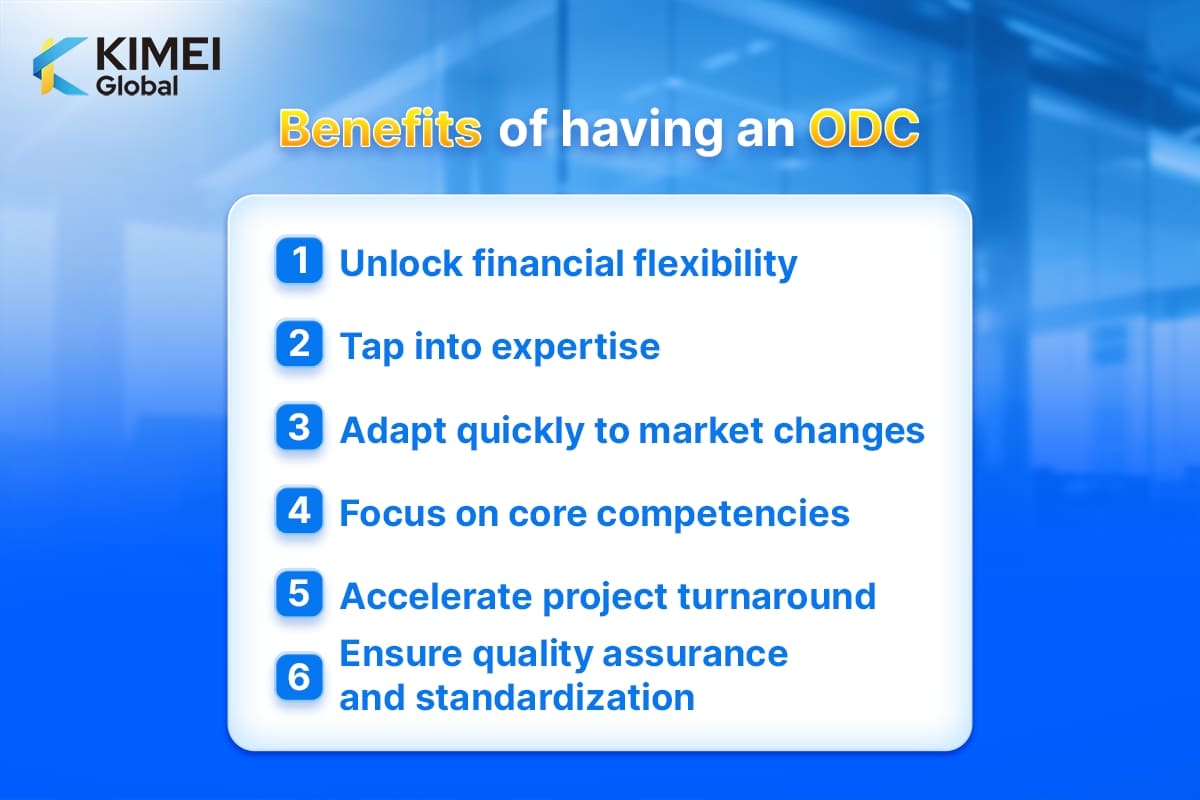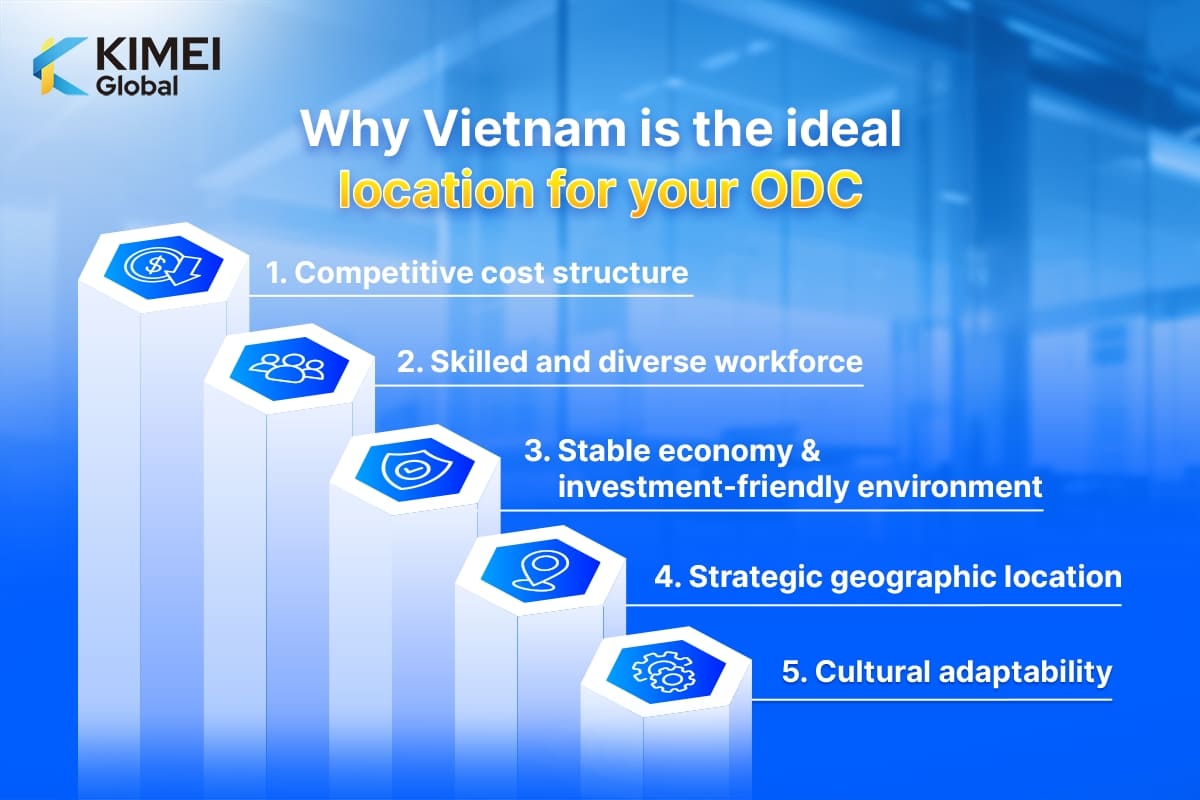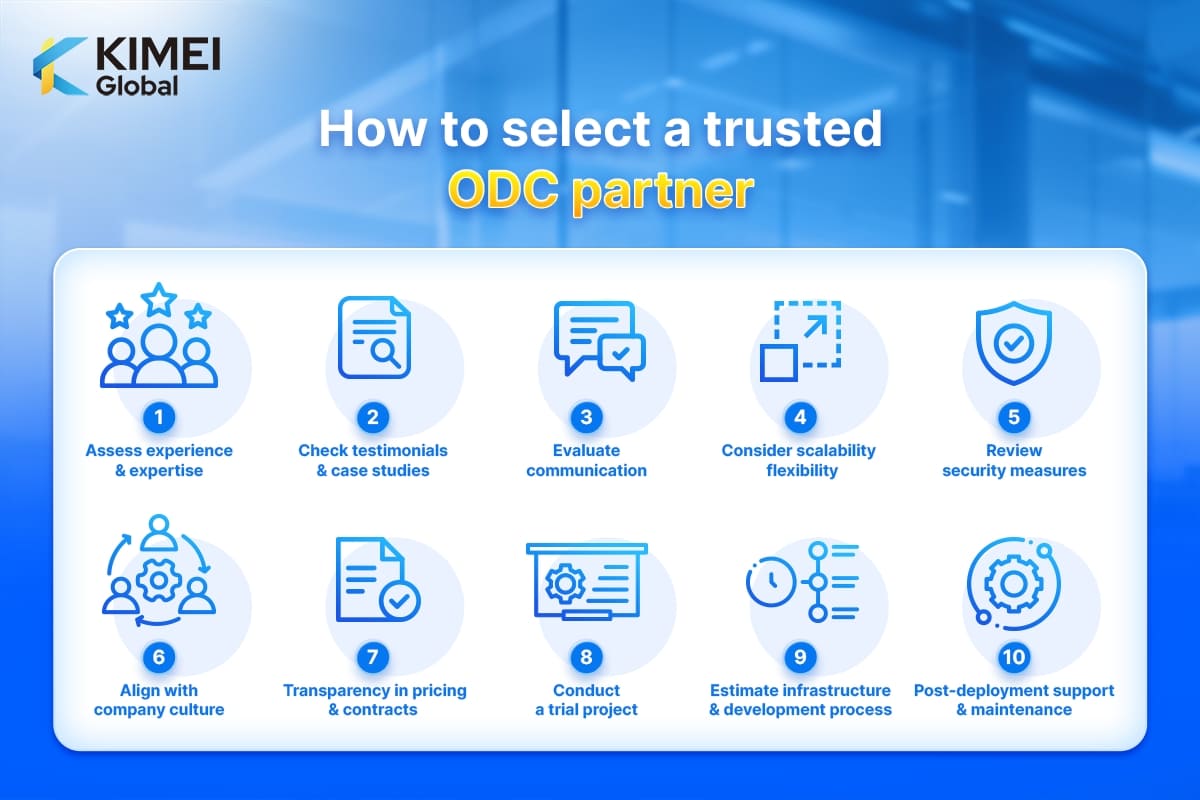
How to Choose the Right Offshore Development Center (ODC) Partner
In today’s global marketplace, many businesses are turning to Offshore Development Centers (ODCs) to enhance growth, reduce costs, and access a wider talent pool. However, the success of an ODC largely depends on selecting the right partner. In this guide, we will explore what ODCs are, the benefits of partnering with one, how they compare to traditional IT outsourcing and provide expert tips on how to choose the right ODC partner for your business.
What is an Offshore Development Center (ODC)?
An Offshore Development Center (ODC) is a dedicated, remote team located in a different country, functioning as an extension of a company's in-house IT or development department. Unlike traditional outsourcing models where projects are handed over to third-party vendors, an ODC operates exclusively for the parent company, aligning closely with its culture, processes, and objectives.
The main idea behind an ODC is to help companies save costs while gaining access to skilled talent from other countries. Companies often set up an ODC in countries where labor costs are lower, which helps them reduce expenses while still receiving high-quality work. At the same time, the company has more control over the work being done because the ODC team is focused exclusively on their projects.
Benefits of having an ODC
When you set up an ODC, the benefits extend beyond cost savings. Let’s take a closer look at why businesses are increasingly turning to ODCs:
-
Cost efficiency: Unlocking financial flexibility
One of the most attractive aspects of an ODC is the potential for significant cost savings. By operating in countries with lower labor costs, businesses can cut expenses on salaries, infrastructure, and overhead.
But the benefits go beyond just lower costs. With these savings, you can redirect resources toward more critical areas such as R&D, marketing, or expanding your product offerings. This financial flexibility allows you to be more agile in a competitive market, scaling your operations efficiently and investing where it matters most.
-
Access to a global talent pool: Tapping into expertise
An ODC opens the door to a global talent pool, allowing your business to tap into specialized skills that may be scarce or expensive in your home country. Whether you’re looking for software developers, data scientists, UX/UI designers, or other technical professionals, your ODC can provide access to top-tier talent from across the world.
This diverse pool of expertise helps foster creativity and innovation within your teams. With people from various backgrounds and experiences, your ODC can bring fresh perspectives and solutions to the table, leading to better decision-making and problem-solving.
Moreover, in markets like Vietnam, there is an abundance of young, highly educated, and
tech-savvy professionals who are eager to contribute to the success of international businesses. This access to highly skilled labor is a game-changer for companies that need to stay ahead in a rapidly evolving technological landscape.
-
Scalability and flexibility: Adapting quickly to market changes
In today’s fast-paced business environment, the ability to scale quickly is critical. Unlike traditional in-house teams, which require significant time and resources to expand, an ODC allows your business to scale up or down according to project demands.
If you’re working on a large product launch or a new feature, your ODC can quickly add more developers, designers, or testers to the team to meet deadlines. Conversely, when demand decreases or project scope changes, you can scale down efficiently without the complexities of local layoffs or rehiring.
This level of flexibility makes an ODC ideal for businesses operating in dynamic industries where market conditions change rapidly. It ensures you’re always equipped with the right resources at the right time, helping you maintain a competitive edge.
-
Streamlining operations: Focusing on core competencies
Establishing an Offshore Development Center (ODC) allows your business to focus on what truly drives its success — core competencies. By delegating IT development and operational tasks to an ODC, you free up valuable time and resources within your internal team, ensuring that your in-house team is not distracted by tasks outside of their expertise. This enhanced focus leads to better decision-making, more innovative solutions, and a clear direction for the company’s long-term success.
-
Continuous development cycles: Accelerating delivery
Operating in different time zones allows ODCs to provide round-the-clock development cycles. For instance, while your in-house team is working during regular business hours, your ODC can continue development during the night, ensuring that projects are progressing without interruption.
The ability to reduce workflow delays and speed up the time-to-market for new innovations can significantly enhance your business’s responsiveness to customer demands and increase market competitiveness.
-
Maintaining consistency: Ensuring quality and standardization
An ODC operates as an extension of your in-house team, which means you can apply your internal processes, methodologies, and quality standards to the offshore team. This level of integration ensures that the work produced by the ODC adheres to your company’s high standards.
Moreover, because the ODC team works exclusively for your business, they become intimately familiar with your processes, products, and goals, leading to better outcomes and more consistent quality. Over time, the ODC team becomes a highly efficient and integrated part of your development operations, improving productivity and minimizing errors.
The ability to maintain consistent quality standards and seamlessly align the ODC with your internal processes gives you confidence in the work being produced, knowing that it meets your exact specifications and business requirements.
Key differences between IT outsourcing and ODC
When considering how to scale your development operations, it’s essential to understand the distinctions between Offshore Development Centers (ODCs) and traditional IT outsourcing models. Both offer significant advantages, but they cater to different needs and involve different levels of control, integration, and long-term commitment. Here’s a breakdown of the key differences:
|
Feature
|
IT Outsourcing
|
Offshore Development Center (ODC)
|
|
Team dedication
|
Works on multiple clients/projects
|
Exclusively dedicated to one client
|
|
Long-term focus
|
Typically project-based
|
Long-term, strategic engagement
|
|
Integration
|
Limited integration with the client’s team
|
Seamless integration with in-house team
|
|
Cost structure
|
Variable, project-based pricing
|
Fixed, predictable operational costs
|
|
Control & management
|
Limited oversight
|
Direct control and management
|
|
Security & confidentiality
|
Data security risks due to shared vendors
|
Enhanced security with dedicated teams
|
|
Commitment & focus
|
Divided attention due to multiple clients
|
Focused efforts aligned with company goals
|
-
Control and integration
-
IT Outsourcing: Typically, vendors manage multiple clients simultaneously, which can result in limited control over processes and challenges in integration with your existing systems.
-
ODC: Your ODC functions as an extension of your in-house team, allowing for greater control, seamless integration, and alignment with your company’s culture and business goals.
-
Security and confidentiality
-
IT Outsourcing: Managing data security and confidentiality can be challenging due to multiple vendors with varying protocols, increasing the potential for breaches.
-
ODC: With an ODC, your company can implement its own security measures and standards, ensuring enhanced protection of sensitive data and intellectual property.
-
Long-term strategic value
-
IT Outsourcing: Often project-based, with a short-term focus, which may not contribute to long-term strategic growth.
-
ODC: Designed for ongoing collaboration, offering long-term benefits such as continuous improvement, knowledge retention, and alignment with the company’s broader vision.
-
Commitment & focus
-
IT Outsourcing: As vendors often juggle multiple clients, their attention is divided, which may affect the quality and timeliness of deliverables.
-
ODC: ODCs provide a dedicated, focused team that works exclusively on your projects, ensuring alignment with your long-term business goals.
Why Vietnam is the ideal location for your ODC
In recent years, Vietnam has risen as a top destination for companies seeking to establish an ODC. The country's unique blend of cost advantages, skilled workforce, strong government support, and strategic location make it an ideal choice. Here's a deeper look at why Vietnam stands out as the perfect location for your ODC.
-
Competitive cost structure
Vietnam offers a compelling cost advantage for businesses looking to establish an ODC. The cost of living is lower compared to Western countries, leading to reduced labor and operational expenses. This affordability does not come at the expense of quality; businesses can access top-tier talent and infrastructure without overspending. According to Talent JDI, hiring a developer with five years of experience in Vietnam is 40% to 60% less expensive than in Singapore or the US.
-
Skilled and diverse workforce
Vietnam boasts a dynamic and diverse workforce, with approximately 530,000 developers and 57,000 new IT graduates entering the labor market annually. This continuous influx of skilled professionals ensures a steady supply of talent proficient in various programming languages and technologies. The country's emphasis on education and technological proficiency makes it an attractive destination for businesses seeking expertise in emerging fields like deep learning and extended reality.
-
Stable economy with investment-friendly environment
Vietnam offers a favorable business environment that attracts international companies looking to establish Offshore Development Centers (ODCs).
-
Economic stability and growth: Vietnam’s economy has remained resilient, even during global challenges. This stability provides businesses with a reliable environment for long-term operations. Additionally, low inflation and a stable currency ensure predictable operational costs.
-
Investment-friendly environment: Vietnam is part of several free trade agreements, such as the CPTPP and the EU-Vietnam FTA, which provide businesses with preferential access to key global markets. The country’s transparent regulatory framework and pro-investment policies make it easy for foreign companies to establish ODCs in Vietnam.
-
Strategic geographic location
Vietnam's geographic location in Southeast Asia provides a unique advantage when setting up an ODC. The country sits in a time zone that offers convenient overlap with key global markets, particularly those in Asia, Europe, and Australia. This strategic location allows for efficient real-time collaboration between teams in different regions, fostering faster decision-making and smoother project workflows.
-
Cultural adaptability
One of the often-overlooked advantages of setting up an ODC in Vietnam is the cultural adaptability that Vietnamese professionals bring to the table. Known for their strong work ethic, adaptability, and willingness to collaborate, Vietnamese workers align well with Western business practices. This cultural synergy minimizes the likelihood of misunderstandings and fosters effective communication and collaboration across teams.
Vietnamese professionals are adept at understanding global business dynamics and can quickly adjust to the specific needs and expectations of international clients. This cultural alignment ensures that your ODC team will integrate smoothly with your existing teams, facilitating strong working relationships and reducing friction. For more on top offshore software development companies in Vietnam, check out
Top 10 Offshore Software Development Companies for E-Commerce in Vietnam 2025.
Defining your ODC project scope
Once you’ve decided to pursue the ODC model, the next step is to define your project scope. Clear objectives and well-defined goals are essential for ensuring your ODC is set up for success. Here are the key elements to consider:
-
Objectives and goals
What do you aim to achieve with the ODC? Whether it’s launching a new product, improving an existing service, or expanding into new markets, having clear goals will help align your ODC team with your vision.
Besides, businesses should establish measurable Key Performance Indicators (KPIs) to track the ODC’s performance. These could include delivery timelines, quality metrics, and cost-efficiency benchmarks.
-
Scope of work
Specify the tasks and responsibilities your ODC will handle, such as
software development, quality assurance, or maintenance.
-
Required skill sets
Identifying clearly the required skill sets will ensure that your ODC partner can provide a team that possesses the skills necessary to meet your needs.
-
Technical Expertise: Identify the technical skills your ODC team will need, such as proficiency in certain programming languages, technologies, or frameworks relevant to your project.
-
Collaboration Skills: Beyond technical expertise, ensure the ODC team has the necessary soft skills — like effective communication and problem-solving — to work seamlessly with your in-house team.
-
Budget and timeline
Set a realistic budget and timeline for the ODC’s operations. Having a well-planned financial and time framework helps ensure smooth execution.
-
Risk management
Effective risk management is vital for anticipating and addressing potential issues during the project. By planning ahead, you can minimize disruptions and ensure smooth collaboration.
-
Communication Challenges: Address potential challenges with language, time zones, or cultural differences. Set clear communication guidelines and ensure there's overlap in working hours for smooth coordination.
-
Security Measures: Ensure your ODC partner follows the highest standards for data security, including encryption, access control, and regulatory compliance, like GDPR.
How to select a trusted ODC partner
-
Assess experience and expertise
When selecting an ODC partner, prioritize companies with a strong track record in your industry. Look for established firms that have successfully delivered similar projects, as this demonstrates their capability and reliability. Evaluate their technical expertise, team composition, and past work to ensure they align with your project needs.
-
Check testimonials and case studies
A trustworthy ODC partner should have positive client reviews, detailed case studies, and references that highlight their ability to deliver quality results. Reach out to their past clients, if possible, to gain insights into their reliability, responsiveness, and overall performance.
-
Evaluate communication
Effective communication is key to a successful ODC partnership. Ensure that the provider has clear communication channels, regular reporting structures, and collaborative tools in place. Language proficiency, cultural understanding, and time zone alignment also play a crucial role in seamless cooperation.
-
Consider scalability and flexibility
Your ODC partner should be able to scale teams up or down based on project needs. Ensure they have the flexibility to accommodate evolving business requirements and technological advancements. A good ODC partner should be able to quickly adjust to your needs without compromising quality.
-
Review security measures
Data security and intellectual property protection are critical when working with an ODC. Verify that your partner follows industry-standard security protocols, including compliance with GDPR, ISO certifications, and NDAs. Ask about their policies on data storage, access control, and cybersecurity measures.
-
Align with company culture
Cultural alignment is often overlooked but plays a vital role in long-term collaborations. Your ODC team should share your company’s work ethic, values, and business vision. A partner who understands your company culture will integrate more seamlessly with your internal teams and contribute effectively to your goals.
-
Transparency in pricing and contracts
Clarify the pricing structure and contractual terms upfront. Look for an ODC partner that offers transparent pricing without hidden costs. Ensure the contract clearly outlines deliverables, service level agreements (SLAs), and exit clauses to avoid any potential disputes in the future.
-
Conduct a trial project
Before committing to a long-term partnership, consider starting with a pilot project. This allows you to evaluate the ODC provider’s performance, communication, and ability to meet deadlines. A successful trial project will give you confidence in their capabilities before scaling up the engagement.
-
Assess infrastructure and development process
Ensure the ODC provider has a robust IT infrastructure, modern development tools, and agile methodologies in place. Ask about their approach to software development, DevOps capabilities, testing frameworks, and project management practices. A well-structured development process leads to more efficient and reliable outcomes.
-
Post-deployment support and maintenance
A reliable ODC partner should provide ongoing support and maintenance after project completion. Ensure they offer continuous improvement, bug fixes, and updates as required. Long-term support is essential for ensuring smooth operations and adapting to future business needs.
Conclusion
Selecting the right ODC partner is a critical decision that can impact your business growth, innovation, and market competitiveness. By clearly defining your project scope, evaluating potential partners thoroughly, and considering Vietnam as a top ODC destination, you can ensure a successful and long-term offshore development collaboration.
Looking for a reliable ODC partner? KIMEI Global offers expert IT outsourcing services tailored to your business needs. Contact us today to discuss your ODC requirements.





